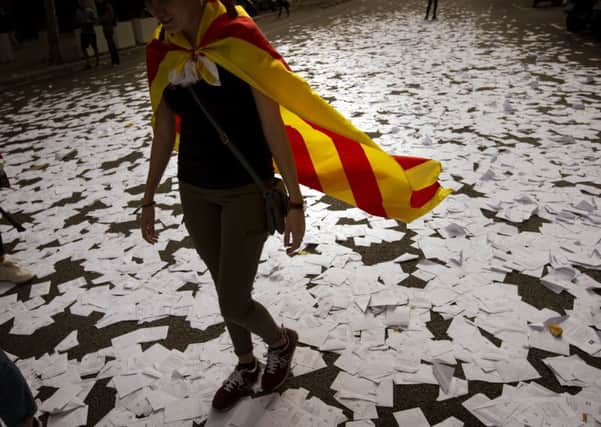Prof Holger Nehring: Generation who lost faith in the ballot box


There has been a rise in populist parties and movements, from the nationalist movement for Catalan independence, quashed by the power of the central Spanish state, to the rise of populist parties and movements in Italy, Germany, Hungary and Poland.
Not only the UK, but also Germany, Spain, Italy, Poland and Hungary have seen persistent calls for referendums as ways to settle complex political issues, from migration to the shape of the constitutional order.
Advertisement
Hide AdAdvertisement
Hide AdLess than 30 years ago, democracy was not a problem, but the solution. After the fall of the Berlin Wall and the end of the Cold War in 1989/90, democracy appeared victorious. Western Europeans embarked on a project of exporting their system of government first across to the formerly communist east and then across the world.
Where does this remarkable shift in attitudes in less than a generation come from? Is democracy really in crisis?
History offers some clues. It shows how developments in the 1970s and 1980s are at the root of current debates.
After 1945, with the end of the Second World War and the beginning of the Cold War, things were simple in Western Europe. It seemed clear what democracy was – and what it was not.
Democracy was the solution. It was the opposite of National Socialism and fascism that had just been defeated; and it was not the authoritarian socialism of Eastern Europe and the Soviet Union.
It also appeared that you did not even need good democrats to run a successful democracy: as the example of West Germany in particular seemed to demonstrate, it was enough to have a good system in place, one that worked through parties that pooled and channelled the people’s will; a system that worked mainly through elections every few years; and a system that relied on top-down bureaucracies to work out technical solutions to complex problems, from welfare, to health, to planning the economy and finance.
The students’ and workers’ movements around 1968 punctured this cosy consensus across Western Europe. They fundamentally questioned the system’s democratic character. It was, they argued, a system that protected the old elites.
From the early 1970s, the successful economic and financial model that underpinned this post-war democracy by providing affluence for most was beginning to crumble, too, as a major economic crisis engulfed all West European countries.
Advertisement
Hide AdAdvertisement
Hide AdAnd this system’s costs were increasingly apparent as well, with environmental pollution becoming a topic of growing public concern in most of continental Europe. West Germany banned the use of cars on Sundays for a short period because of a perceived lack of petrol supplies from the Middle East – the famous Autobahns were left empty and used by ramblers. Italy saw the rise of both right-wing and left-wing terrorism and faced a crisis of government that was severe even by the unsettled standards of Italian post-war politics. These were “the years of lead”.
Across Western Europe, politicians and public intellectuals now discussed a “crisis of governability”. Many European conservatives looked admiringly towards the Latin American dictatorships, such as Augusto Pinochet’s Chile, as a way out.
Many progressive citizens, disappointed by what they saw as their government’s lack of action, took things into their own hands. They formed new social movements. These social movements zoomed in on single issues: environmental damage, poverty, peace, women’s and LGBT rights, anti-racism – issues that the traditional politics had tended to ignore as they concerned identities rather than policies.
The movements sought local solutions for global problems; they championed a form of politics that was inclusive and bottom-up. The issues they raised defied traditional political bargaining and negotiations and raised deep moral questions: you were either in favour of or against peace; in favour of building that nuclear power station or against it; in favour of women’s emancipation or against it.
Activists also argued that experts and bureaucrats in government could no longer be entrusted with solving these problems. They turned themselves into experts by reading up on the issues – from the design of nuclear power stations, to the toxicity of certain products, to the design of particular weapons systems.
They also established their own media, as they felt that the mainstream papers and TV stations did not represent their concerns.
With the period of Cold War détente from the mid-1980s, the ideological parameters of the Cold War, according to which the good Western European democrats faced off evil East European communists, were beginning to lose their plausibility.
Now that the enemies of democracy were gone or seemed less dangerous, it was also no longer clear what democracy was. Most people still supported the established pattern, but purely out of convenience. Today, the grassroots model of political organising has spread from its origins on the political left across the political spectrum.
Advertisement
Hide AdAdvertisement
Hide AdThe current discussions about the new populism are the most recent incarnation of such debates about the shape of democracy. These debates involve big and difficult questions of who is represented by whom, and how this representation should happen.
The fact that many now see democracy as a problem does, therefore, not in itself mean that democracy is failing. Recognising the specific problems of democratic government can help find solutions, too. Democracy as a form of government will only fail if we do not constantly remind ourselves of the fundamental values that underpin it: mutual respect of different positions, civility in resolving political disagreements, and our own active engagement for the public good.
Holger Nehring is Professor of Contemporary European History at the University of Stirling. He has recently co-edited the book The History of Social Movements In Global Perspective (Basingstoke: Palgrave, 2017)